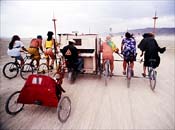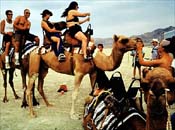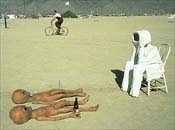Center Camp Stage – Black Rock City, NV
Saturday September 5, 1998 5pm
With unbounded gratitude for the magic, Mark Giannetto. Larry Harvey, ladies and gentlemen. Let’s hear it! The hardest working man in show business.
[applause]
LH – Thank you. Hi y’all. Thanks for comin’. I was reading a ‘zine a while back and there was an interview there about Waylon Jennings. Somebody got backstage and talked to Waylon Jennings, the ‘Country Music Star’. And he said, “You know it’s funny. You play your music because you love it, you play it for the people you love. And, uh, it’s a little community. And they come and you know them and they know you, and what’s more, if you miss a note, they know it too. They’re your best critics. Then one day you find your self up on a stage facing 10,000 people, and if you miss a note, they don’t know it. They don’t care. They came to see ‘Waylon Jennings'”.
You see what happened to Waylon Jennings is that he became commodified. Waylon became a product. And I’m sure his agent told him, “if you want to get into this or that musical style because it suits your sense of personal expression, you better not because you’re a commodity now and you’re turning out a product and people want that ‘Waylon Jennings Music’.” So it stunted his art career. And of course the community lost him too.

There’s a whole industry out there, led by talent scouts, who go about and they look around and they see those places where culture shoots up like a weed through pavement. And when they see it; they grab it, and they pluck it, and they turn it into a product. It’s called commodification.
Now, we had an article in the Reno News here, a deal_with_y’all_weekly out here, and they said “oh my god they’ve gone corporate, they’re so commercial”. Because we sell T-shirts — not here, we sell em through our newsletter and at a dusty little shop in Gerlach — and we charge to get in.
And I’ll tell you that’s commerce, but we’ve never been against commerce. I mean commerce is civilization, commerce was the Silk Route. Commerce was the Indians trading obsidian for sea-shells. Nothing wrong with commerce. We’re against commodification. That’s what we don’t do here.
What happened to us is that people, about 200 years ago, I don’t know about the history, but I’ll research it, I’m interested in this stuff — they invented mass production. It started in England essentially, spread to Europe, and they found out that they could make these machines that would turn out textiles at an incredible rate, so they needed wool. And so the people with property decided to confiscate what were called ‘the commons’. Now those were lands that were shared by everybody. That was a long tradition through the feudal days of Europe.
And they said, “No, that’s not in common with anybody. That’s property, because we can make a big buck if we put sheep on that land and sell it to the mill owners.” And suddenly they created, overnight, a class of displaced people, who’d lived in the country, who had a culture that went back hundreds of years, that connected them to each other, and connected them to the land. And they said “get out of here, because money dictates it. Because this is ‘Mass Production’.” And they created a class of landless people that became what Marx finally called the Proletariat. And these were people who’d been deprived of their folk culture, and deprived of high culture, they’d been deprived of everything. And they turned into the ‘trash’ of the world.

And that process has been going on ever since. You see, there was a day in our world, when half of the economy out there was based on the conventions of culture and customary relations and sharing. The kind of values a community creates. Now I don’t know if you’ve noticed, but we ban commerce from the city, because we’re trying to create a gift economy. Now you’ve probably noticed that this is a gift economy were running on out here.
[cheers]
Now gift giving is interesting, because when you give someone a gift it creates a bond between you and them. Now, you may not always want a bond. If you’re buying gum from someone in a subway, you just want gum, and you want to get on your train. You don’t want a connection.
Well, what’s happened to our world is that the economy of gift giving has shrunken down to almost nothing, and all of the commerce we have has been commodified. It exists still in little pockets within families — if you go out and get something at the store — if your mother-in-law says “get me some cigarettes” — then you’re not going to charge her for it. ‘Cause you know you’re connected to her, in this heart felt way, in your little community of the family, but half of the American Families now spend their time sitting on their couches watching TV in a hypnoidal trance, and they don’t talk to one another, and really about 95% of our lives have turned into economic transactions which don’t connect us to anything.
The fact that 5 million people consume the same beverage at the same time doesn’t mean a thing. We’ve created this world in which — they do these demographic studies, and they find out people think they want, and then in a kind of seance they summon up before you the Ghost of Your Own Desire and they sell it to you. And it doesn’t connect you to anything. It connects you to your own individual desires, and then it turns out as it so often does in life, that what you wanted wasn’t what you needed. So we spend all our time now, consuming stuff, consuming these dream images that nourish us spiritually like Styrofoam pellets. They don’t do us any good.

Burning Man originally comes out of the Bohemian scene of San Francisco. Right? And we’ve given you all a chance to live like artists out here. Everyone of you can live like an artist. That means you can give everything away and live on the edge of survival. Just give it all away, live on the edge of survival, ’cause that’s how artists live.
And a funny thing happens when you start doing that. A guy came up to me, he was working on a project out here a couple nights ago. It was really late, we stood in the dark, I was dead tired and I listened to what he said. And he said, “You know my girlfriend just left me” — well, I can identify with that [laughter] — “I’ve quit my job, and about 2 months ago I realized that if I didn’t give everything to what I’m doing, it wouldn’t happen. So I just decided I’d open up my heart and give everything to it. And after I made that decision, the funny thing was, every time we came to a place where we didn’t seem to have resources, and we couldn’t do it, they appeared.”
Well, that’s because he opened up his heart and he started giving it all, and other people were inspired by that and so they started doing that, and pretty soon, they had all got together, and they were imitating one another, and they were emulating one another, and they were cooperating with one another, and they were collaborating with one another. I think this experience is going to change his life. ‘Cause he’ll go back to San Francisco, and he’ll think “Well, it’s only 364 days till the next Burning Man, it’s only 363 days.” Then it’s going to dawn on him, what the hell’s he waitin for?
People come out here, and all their lives they’ve said to themselves, “I’d realize my vision, except for circumstance. It’s my family, I don’t have training, I don’t know anyone, I don’t have capital. Otherwise I’d do it.” Then they come out here and they see other people coming in here who have miracled up worlds out of nothing. And they did it through cooperating, and collaborating, and creating resources. You go back home and you think, “Well, that was a lot of bullshit. I was the only person stopping myself.” And that’s really the fundamental basis for our growth. What we’d like to see is the world get back to a point, where,…
Years ago, people asked me why the cybernetic people were coming out here, why the Internet people were coming out here, and I didn’t have a clue ’cause I was still using a bic pen. [laughter] And gradually it dawned on me why they come out here. There’s a great change coming over the world. These people’ve been inhabiting a world on the Internet which is non-hierarchic, radically democratic, essentially populist in character, in which you create your own reality and move where you want, and you wouldn’t be judged for it. And they looked at this place and they said, “Geez, that’s an analog of cyber… that’s cyberspace come true.” What they are beginning to realize is that you’re never going to fill the community in cyberspace, but it’s been one hell of a means of communication. And it’s possible then – and what I always say is you don’t have a community till you can smell people, so by that standard we have a hell of a community out here.
[laughter]

And what happened then, they found out that this is the analog to cyberspace, but it’s different, because it’s not anonymous and it’s not vicarious like the Internet can be. So it puts people in touch with one another and then we work hard all year round to contact them, tell them who lives near them and get them together and they start talking and they say “Why are we waiting for Burning Man? We can apply the same principles we learned out at Burning Man to our lives.” And it turns out the world is changing fast and we’re teaching valuable survival skills out here, this is about radical self-expression and radical self-reliance. There’s a world coming where you’re going to need self-reliance.
Someone asked me, “Well, how powerful do you think the Internet is? And how is that going to change our lives” And I said “well, there were these nomadic pastoral people who lived up north of Europe and descended in wave after wave and conquered it. For a simple reason: Somebody invented the stirrup. And it allowed you to sit on the horse in a saddle and shoot a bow and arrow. And suddenly they took over the whole civilized world several times over.”
Well the Internet is our stirrup. ‘Cause you can be anybody on the Internet, and if you have an idea it will begin to pervade. The state doesn’t know how to use the Internet and they can’t control it. Corporations are trying to figure out how to use the Internet but they think it’s a big billboard. They don’t understand that it’s an interactive medium and you’re not sitting there in a hypnotic trance absorbing all these ads passively. And if they get a thousand or a hundred thousand hits on their website it doesn’t really matter. But we know how to use the Internet because we use it interactively. We apply all the principles that we’ve developed to create and make a society, to create a community that foments a culture, and we’ve applied it to the Internet. And what’s happening, is that all over this country right now, people are coming back from Burning Man, and they’re beginning to try to live like Burning Man in their daily lives. I mean this event doesn’t really mean a whole lot if it’s just an entertainment event; just a way to blow off steam and then go back to what we call reality. What they call reality really isn’t going to be reality in the future, and it never really was.
If you look beyond the horizons of this world we’ve created here, you begin to understand that there’s an enormous appetite out there for a kind of community in which culture is created.

